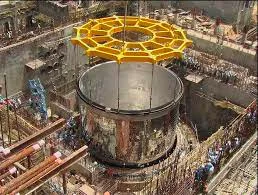Answer:
| Approach:
Introduction
Begin by acknowledging India’s nuclear science and technology journey, starting with the establishment of the Atomic Energy Commission in 1948.
Body
- Trace the trajectory of nuclear science and technology development in India.
- Discuss the role and advantages of the Fast Breeder Reactor program in India.
- Substantiate with examples too.
Conclusion
- Summarize the progress in India’s nuclear science and technology and the transformative potential of programs like the fast breeder reactor for India’s energy landscape.
|
Introduction:
Embarking on its journey in nuclear science and technology post-independence, India has etched significant milestones in this field. This path, marked by unyielding dedication and innovation, began with the establishment of the Atomic Energy Commission in 1948, aiming to harness the atom’s power for national progress and strategic necessities.
Body:
Growth and Development of Nuclear Science in India:
- Atomic Energy Commission: The Atomic Energy Commission (AEC), set up in 1948 under the leadership of Homi J. Bhabha, marked the beginning of India’s nuclear program.
- Atomic Energy Establishment: In 1954, the Atomic Energy Establishment, Trombay (AEET), was founded, which later became the Bhabha Atomic Research Centre (BARC).
- Nuclear Power: India’s first nuclear power plant was commissioned in 1969 at Tarapur, Maharashtra, which marked a significant step in the country’s nuclear power generation.
- Pokhran Tests: India demonstrated its nuclear capabilities to the world with the peaceful nuclear explosion at Pokhran in 1974, and later in 1998.
- Indigenous Development: Post the Pokhran tests, India faced international embargos which led to the development of indigenous technology for both power generation and strategic purposes.
India’s three-stage nuclear power programme was conceived by Dr. Homi J. Bhabha in the 1950s.
The program was designed to utilize India’s substantial thorium reserves to meet its long-term energy requirements.
- Stage One – Pressurized Heavy Water Reactor (PHWR): In this stage, natural uranium is used as fuel in PHWRs. The uranium-235 isotope undergoes fission to produce energy, while the uranium-238 isotope absorbs neutrons to produce plutonium-239.
- Stage Two – Fast Breeder Reactor (FBR): The second stage utilizes plutonium-239, obtained from the first stage, as fuel in FBRs. These reactors breed more fuel than they consume. The bred material, a mix of plutonium and uranium, is reprocessed to extract plutonium for use in the next batch of fuel.
- Stage Three – Thorium Based Reactors: In the final stage, thorium-232 is converted into uranium-233 in a reactor. The uranium-233 will then serve as fuel. Given that India has one of the largest reserves of thorium in the world, this stage will help achieve energy security.
As of 2023, India is in the second stage of its nuclear power program, with Fast Breeder Reactors being developed and tested. The successful operation of these reactors is crucial for moving to the third stage.
Advantages of Fast Breeder Reactor Programme in India:

Fast Breeder Reactors (FBRs) form an important component of India’s three-stage nuclear power program. They offer several advantages:
- Efficient Utilization of Resources: FBRs can utilize uranium more efficiently by converting non-fissile uranium (U-238) into fissile plutonium (Pu-239). An example of this is the Prototype Fast Breeder Reactor (PFBR) at Kalpakkam.
- Reducing Nuclear Waste: FBRs can help in reducing the amount of nuclear waste due to their ability to burn actinides, which are major contributors to long-term radiotoxicity of nuclear waste.
- Energy Security: FBRs are vital for long-term energy security in India, which has limited reserves of uranium but abundant reserves of thorium. This thorium can be converted into fissile uranium-233 in FBRs.
Conclusion:
The development of nuclear science and technology in India, marked by remarkable milestones, showcases the nation’s unwavering commitment to progress. It has been a path of learning, resilience, and ingenuity, leading to the creation of strategic assets like the fast breeder reactor program. These programs promise to transform India’s nuclear landscape, offering sustainable and secure energy solutions while minimizing environmental impact.
